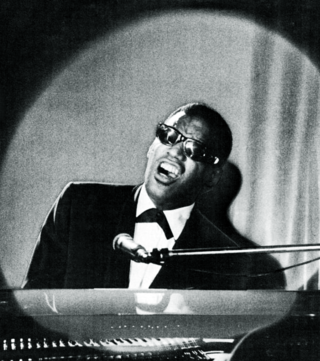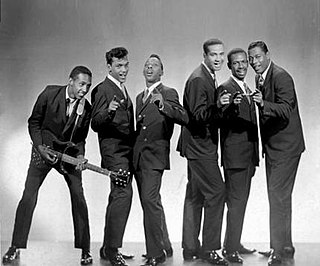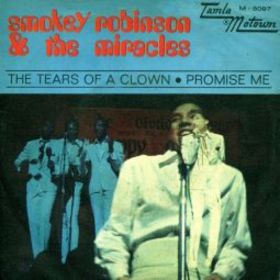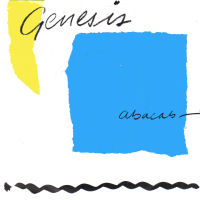
Soul music is a popular music genre that originated in the African-American community throughout the United States in the late 1950s and early 1960s. It has its roots in African-American gospel music and rhythm and blues. Soul music became popular for dancing and listening, where U.S. record labels such as Motown, Atlantic and Stax were influential during the Civil Rights Movement. Soul also became popular around the world, directly influencing rock music and the music of Africa. It also had a resurgence in the mid-to late 1990s with the subgenre neo-soul, which added modern production elements and influence from hip-hop.

Doo-wop is a subgenre of rhythm and blues music that originated in African-American communities during the 1940s, mainly in the large cities of the United States, including New York, Philadelphia, Pittsburgh, Chicago, Baltimore, Newark, Detroit, Washington, D.C., and Los Angeles. It features vocal group harmony that carries an engaging melodic line to a simple beat with little or no instrumentation. Lyrics are simple, usually about love, sung by a lead vocal over background vocals, and often featuring, in the bridge, a melodramatically heartfelt recitative addressed to the beloved. Harmonic singing of nonsense syllables is a common characteristic of these songs. Gaining popularity in the 1950s, doo-wop was "artistically and commercially viable" until the early 1960s and continued to influence performers in other genres.

Minnie Julia Riperton Rudolph was an American soul singer and songwriter best known for her 1975 single "Lovin' You", her five-octave vocal range, and her use of the whistle register.

Mary Hopkin, credited on some recordings as Mary Visconti from her marriage to Tony Visconti, is a Welsh singer best known for her 1968 UK number 1 single "Those Were the Days". She was one of the first artists to be signed to the Beatles' Apple label.

Nicola James Capaldi was an English singer-songwriter and drummer. His musical career spanned more than four decades. He co-founded the progressive rock band Traffic in 1967 with Steve Winwood with whom he co-wrote the majority of the band's material. He was inducted into the Rock and Roll Hall of Fame as a part of Traffic's original lineup.

The Dells were an American R&B vocal group. Formed in high school in 1953 by founding members Marvin Junior, Verne Allison, Johnny Funches, Chuck Barksdale, and Michael and Lucius McGill, under the name the El-Rays. They released their first recording in 1954 and two years later had their first R&B hit with "Oh What a Night". After disbanding due to a near-fatal car crash in 1958, the band re-formed in 1960 with Funches being replaced by Johnny Carter. This lineup remained together until Carter's death in 2009. In 2004 the Dells were inducted into both the Rock and Roll Hall of Fame and the Vocal Group Hall of Fame. The group performed until illness forced longtime lead singer Marvin Junior and bass vocalist Chuck Barksdale into retirement, ending the group's 60-year run.

"Goodnight, Irene" or "Irene, Goodnight," is a 20th-century American folk standard, written in 3
4 time, first recorded by American blues musician Huddie 'Lead Belly' Ledbetter in 1933. A version recorded by the Weavers was a #1 hit in 1950.

"The Little Drummer Boy" is a popular Christmas song written by American composer Katherine Kennicott Davis in 1941. First recorded in 1951 by the Austrian Trapp Family, the song was further popularized by a 1958 recording by the Harry Simeone Chorale; the Simeone version was re-released successfully for several years, and the song has been recorded many times since. In the lyrics, the singer relates how, as a poor young boy, he was summoned by the Magi to the Nativity of Jesus. Without a gift for the Infant, the little drummer boy played his drum with approval from Jesus's mother, Mary, recalling, "I played my best for him" and "He smiled at me". Despite the song's popularity, the story of the drummer boy is not biblically accurate.

The Contours are an American rhythm and blues vocal group.that recorded for Motown Records .They are known their 1962 smash hit single "Do You Love Me", which sold over 1 million copies and became a major hit again in 1988.

Renaldo "Obie" Benson was an American soul and R&B singer and songwriter. He was best known as a founding member and the bass singer of Motown group the Four Tops, which he joined in 1953 and continued to perform with for over five decades, until April 8, 2005.

"The Tears of a Clown" is a song written by Hank Cosby, Smokey Robinson, and Stevie Wonder and originally recorded by Smokey Robinson & the Miracles for the Tamla Records label subsidiary of Motown, first appearing on the 1967 album Make It Happen. The track was re-released in the United Kingdom as a single in July 1970, and it became a number-one hit on the UK Singles Chart for the week ending September 12, 1970. Subsequently, Motown released a partially re-recorded and completely remixed version as a single in the United States as well, where it quickly became a number-one hit on both the Billboard Hot 100 and R&B Singles charts.

"Life Is a Rock (But the Radio Rolled Me)" is a 1974 song written by Norman Dolph (lyrics) and Paul DiFranco (music). It was recorded by an ad hoc group of studio musicians called Reunion, with Joey Levine as lead singer. The lyrics are a fast patter of 1950s, 1960s, and 1970s disc jockeys, musicians, songwriters, record labels, song titles and lyrics, broken only by the chorus, similar to the way the song "I've Been Everywhere" listed place names. Levine had previously been lead singer and co-writer of bubblegum music hits "Yummy Yummy Yummy" and "Chewy Chewy" by the Ohio Express. "Life Is a Rock" peaked at No. 8 on the Billboard Hot 100 chart and reached No. 33 on the UK Singles Chart.

The Other Side of Life is the twelfth studio album by English progressive rock band the Moody Blues, released in April 1986 by Polydor Records.

The Masked Marauders is a record album released on the Warner Bros./Reprise/Deity label in the fall of 1969 that was part of an elaborate hoax concocted by Rolling Stone magazine.

"Abacab" is a song by the British rock band Genesis, released on 14 August 1981. It was produced by Genesis and distributed in the United States by Atlantic Records and Warner Music Group. The song, written by Mike Rutherford, Tony Banks and Phil Collins, was featured on Genesis' album of the same name and was a top 10 hit on the British pop chart, where it peaked at No. 9. The song was the second single from the album in the US, where it peaked at No. 26 on the Billboard Hot 100 chart in early 1982. It stayed in the Top 40 for six weeks.

High Voltage is the debut studio album by Australian hard rock band AC/DC, released only in Australia and New Zealand, on 17 February 1975. Their first international release in 1976 would also be named High Voltage, though with a radically different track list.

"I Love Rock 'n' Roll" is a rock song written by Alan Merrill and Jake Hooker and first recorded by the Arrows, a British rock band, in 1975. A 1981 cover version by Joan Jett & the Blackhearts, released as the first single from her album of the same name, became Jett's highest-charting hit, reaching number one on the Billboard Hot 100 and becoming the No. 3 song for 1982. The single was certified platinum by the Recording Industry Association of America, representing two million units shipped to stores. Jett's version was inducted into the Grammy Hall of Fame in 2016.
The Monotones were a six-member American doo-wop vocal group in the 1950s. They are considered a one-hit wonder, as their only hit single was "The Book of Love", which peaked at No. 5 on the Billboard Top 100 in 1958.

"Skinny Minnie" is a 1958 song co-written and recorded by Bill Haley and his Comets. The song was released as a Decca single which became a Top 40 chart hit in the U.S., peaking at #22 on the Billboard chart.

Rock & Roll Is Here to Stay! is the debut album by American doo-wop and rock & roll group Sha Na Na, issued in 1969 and reissued in 1973.
















